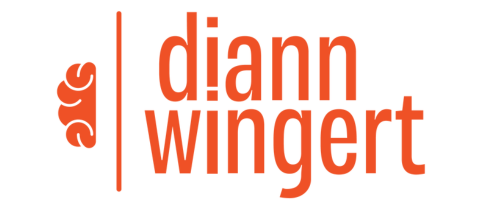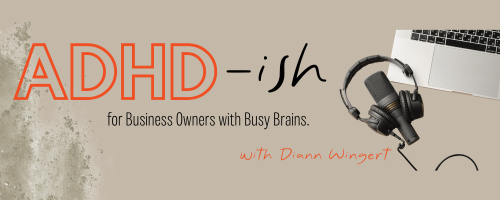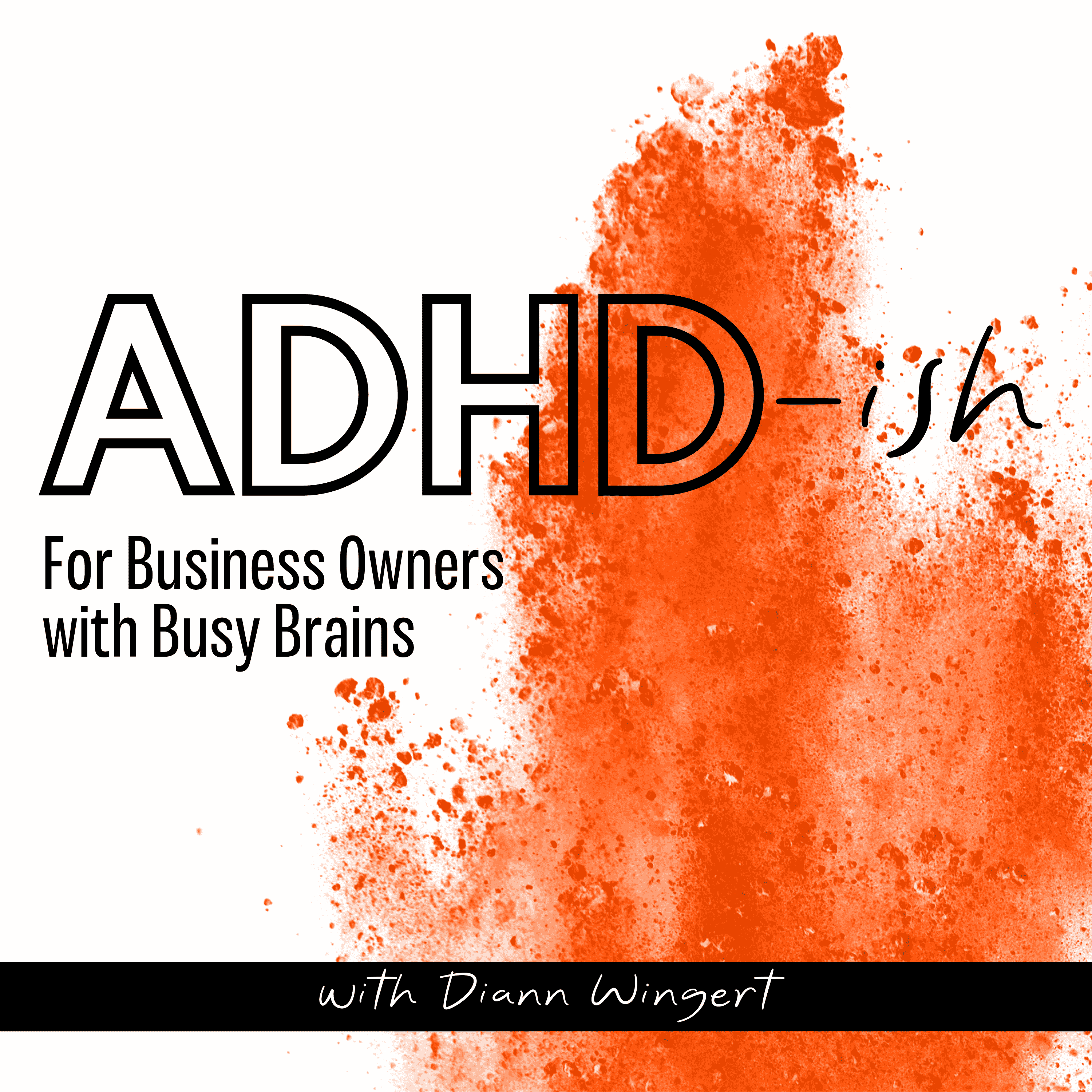Episode 263
Wicked Wisdom: Real Talk on Neurodiversity & Self Acceptance
I decided to do something special for this episode, because this week is our 5th podcast anniversary (and it's also Mental Health Awareness Month.)
One of the most challenging things about being neurodivergent is learning to accept ourselves in a world where being different often marks you as an outsider.
Using my obsession with Wicked and exploring four of Stephen Schwartz’s iconic songs —from the hopeful longing of "The Wizard and I" to the defiant liberation of "Defying Gravity"—my goal in this episode is to connect them to the distinct stages of our ADHD journey in learning to embrace our differentness.
So, grab your broomstick and let’s go on an adventure to Oz.
Episode Highlights:
Let's take a trip through four major songs from “Wicked” that map out the ADHD journey to self-acceptance:
- “The Wizard and I”: The bittersweet hope that someone or something outside of us will finally fix what feels broken.
- “Popular”: The pressure to fit into neurotypical molds, no matter how unnatural it feels, and why those “helpful tips” so rarely work.
- “Defying Gravity”: The exhilarating breakthrough of embracing your true self and rejecting systems that were never built for your brain.
- “For Good”: Honoring everyone who contributed to your journey, finding peace with imperfection, and stepping into deeper self-acceptance.
Whether you’re still searching for that magic fix, trying to fit into neurotypical norms, or learning to soar with your own brand of brilliance, this episode is an invitation to recognize the real magic within yourself.
Join me as I encourage us all to “keep defying gravity together”—and celebrate just how far we’ve come, thanks to a little help from our friends in Oz.
Inspired by this episode? Click this link to share it with a friend.
Complete song lyrics for “The Wizard and I”, “Popular,” “Defying Gravity,” and “For Good” can be accessed here for reference. Used with permission by Scribd.
All songs from “Wicked” were written by Stephen Schwartz and the clips used in this podcast recording were performed by various artists from The Studio Allstars
Used with permission from One Media Publishing
Digital distribution label based in Pinewood Studios, UK ©2008
© 2025 ADHD-ish Podcast
Transcript
Well, hello, friend. In honor of our fifth podversary and mental health awareness month, I decided to do something a little different with this episode. Instead of our usual format, I'm taking you along on a journey to Oz. Not the one with the yellow brick road and the little dog too. We are talking about the story of what happened before Dorothy dropped in. That's right. We're exploring Wicked. And in case you're thinking, what does a fictional witch with green skin have to do with ADHD? Well, buckle up, because Elphaba's journey from outcast to badass offers some surprisingly perfect parallels to our neurodivergent experience.
Okay, I admit it. I've been obsessed with Wicked. First, the musical, which I saw three times, and more recently, the movie, which I somehow managed to only see twice. And you know what I realized? The music doesn't just tell Elphaba's story, it tells ours too. Several of the major songs, I believe, capture a distinct phase of the ADHD journey, the journey towards self acceptance. And today, we're going to explore four of them. So grab your broomstick, and let's look at what a green witch can teach us about embracing our wonderfully weird neurodivergent brains.
Well, as you just heard from that snippet of the song, The Wizard and I, a hopeful yet heartbreaking song where Elphaba dreams about someday meeting The Wizard of Oz because she's convinced that once she meets the wizard and he meets her, he'll be able to see past her green skin and recognize her talents and her true value. Maybe he'll even de-greenify her and stand proudly by her side, and suddenly, all of her problems will disappear. Sound familiar? Well, this is magical thinking at its finest, something I often refer to as the magic pill. The belief that something outside ourselves will finally fix us and make us acceptable.
For those of us with ADHD, this might be the phase where we think, once I find the perfect planner, I'll finally be organized. Or when I get my diagnosis slash medication from that slash therapist or coach, I'll be able to function like everyone else. Or even, if I could just land that perfect job, relationship, achievement, fill in the blank, I'll finally feel normal. We pin all of our hopes on external solutions for what we perceive as internal defects. I call this the fix me phase of embracing and accepting our ADHD. We're convinced that our brains are fundamentally broken, and we just need the right tool, the right person, or the right opportunity to repair them.
We are Elphaba, singing our hearts out about how the wizard will solve everything. While the real issue isn't that we need fixing, but that we're trying to operate in a world that wasn't built for brains like ours. You know, the heartbreaking thing about the wizard and I song isn't just Elphaba's naive hope. It's that the wizard can't even deliver what she's looking for. He doesn't have real magic, but she does. He can't take away her green skin any more than someone can take away your ADHD traits. And here's the kicker, even if he could, it would mean erasing a fundamental part of who she is and the very source of her very real power.
Just like our ADHD traits are inseparable from the creativity, passion, and unique perspectives that make us who we are. The song, The Wizard and I, represents that stage where we're just desperately seeking external validation, and still believing that if we could just be normal, everything would be better. It is a necessary part of the journey, but it's only the beginning.
Now let's take a look at the song Popular. Ever so catchy, seemingly lighthearted, where Glinda offers to give Elphaba a makeover. On the surface, it's funny and sweet. Glinda can seem generous and even genuine about wanting to help her roommate fit in and be accepted. But when you listen more closely to the lyrics, “when someone needs a makeover, I simply have to take over, I know I know exactly what they need”. This is the ADHD equivalent of every well meaning person who's ever told you, have you tried making lists? What about a calendar, honey? Or you just need to try harder to focus. Or my personal favorite, doesn't everybody feel that way sometimes?
See, Glinda represents the neurotypical perspective. She has succeeded by following all the rules and social conventions to a T and benefited from it. So naturally, she thinks all of Elphaba's problems would be solved if she simply did the same. She's not being malicious. She genuinely cannot comprehend that Elphaba's experience of the world is different from her own. That's neuro-normative bias, they don't get us because they can't get us. When Glinda sings, “don't be offended by my frank analysis, think of it as personality dialysis”. She's essentially saying what many neurotypicals tell us. Your natural traits are something to be filtered out, cleaned up, and removed.
The problem isn't Glinda's intent. It's her fundamental misunderstanding of the situation. She truly believes that Elphaba's issues are superficial and fixable with just the right hair flip technique and the right attitude. But Elphaba's green skin isn't going away with a makeover. Just like our ADHD brains are not going to start functioning neurotypically simply because someone introduced us to a new organizational system. This is the stage where we try to adapt to neurotypical expectations, and it can last for decades. I call this the pick me stage because we are willing to try just about anything to fit in. We attempt to follow their systems, use their techniques, and adopt their habits.
We accept the makeovers offered by well-meaning friends, family members, teachers, and bosses, sometimes even therapists and coaches. But when these so-called solutions don't stick, we feel like failures. What makes this especially confusing is that sometimes these approaches do help, at least temporarily. Elphaba does experience a moment of acceptance at the Oz Dust Ballroom after Glinda's intervention. But make no mistake, it is conditional acceptance and thoroughly dependent on her continuing to follow Glinda's rules and hide her true nature. This pick me stage requires that we contort ourselves to fit a neurotypical mold instead of creating systems that work for our unique brain wiring. It's simply not sustainable, but many of us get stuck here for years, if not decades, wondering why can't we just make it work?
Now we come to the breakthrough, defying gravity. The pivotal moment where Elphaba rejects the system that would require her to compromise her values and deny her true nature. After discovering the wizard's deception and cruelty, Elphaba has to make a choice, conform and be rewarded or resist and be vilified. When she sings, “I'm through accepting limits because someone says they're so”, she's making a declaration that resonates with every neurodivergent person who's ever been told to function in ways that are simply impossible.
This is the ADHD equivalent of the moment you realize, wait, maybe there's nothing wrong with my brain. Maybe there's something wrong with expecting all brains to work the same way. It's when you stop trying to use systems and strategies designed for neurotypical brains and start creating your own. It's when you stop apologizing for requesting accommodations and start unapologetically asking for what you need. It's when you realize that rejection sensitivity, time blindness, and executive functioning challenges are not moral failings. They're simply how you're wired. One of the most powerful lines in Defying Gravity just might be, “too long I've been afraid of losing love, I guess I've lost.”
This to me speaks to the exhaustion of masking and of constantly trying to be someone you're not in order to maintain conditional approval and acceptance. That fear of losing love if people see the real you, your messiness, your forgetfulness, your intensity keeps so many of us trapped in cycles of shame and pretending. But here's what Elphaba discovers. When she stops trying to please everyone else, and starts being true to herself, she doesn't become less. She becomes more powerful than she ever imagined possible. She literally defies gravity, a perfect metaphor for transcending the limitations others have placed on her.
This is the turning point in our ADHD journey, radical self-acceptance. I call it the let me stage because at this point, embracing our true selves gives us the courage to accept the fact that there are others who simply never will. It's not about giving up or giving in. It's about recognizing that your brain works differently, and you are entitled to build a life that works with those differences instead of constantly rejecting them or fighting against them. Defying gravity is about saying F you to a system that was never built for you in the first place, and finding the courage to forge your own path, even when others call you wicked for doing so.
And finally, we come to the poignant song, For Good. The emotional duet between Elphaba and Glinda near the end of the musical and movie. This song is about acknowledging how people can profoundly impact our lives, even when our paths need to diverge in order for us to grow. When they sing, “because I knew you, I have been changed for good”, they're recognizing how they've transformed each other, even though they cannot continue together. For those with ADHD, this represents a mature stage of true acceptance. One I call the love me or lose me stage, where we can acknowledge the influence of neurotypical perspectives without deciding to continue conforming to them. It's about making peace with our journey and all the years that we spent trying to be normal.
The well-meaning but misguided advice we followed, the masks we wore, and the pain of never quite fitting in no matter how hard we tried. It's also about releasing resentment toward a world that just doesn't understand us while still establishing the kind of boundaries that protect our authenticity. The song For Good is also about honoring the people who have supported us along the way, however imperfectly. The teachers who may not have understood our ADHD, but still saw our potential. The friends who might not grasp our brain wiring, but love us no matter what. The family members who tried their best with the knowledge they had, including the ones who also had ADHD and didn't know it.
There's a line in the song, “so much of me is made from what I learned from you”, and this reminds us that even the difficult parts of our journey, the missed diagnoses and the wrong ones. The harmful coping mechanisms, the times we tried to force ourselves into neurotypical boxes, all these things have truly helped shape who we are today. They weren't wasted experiences. They were necessary steps toward self-knowledge and self-acceptance. This stage that I call the love me or lose me stage of the ADHD journey is where true integration happens. We're no longer defined by our rebellion against neurotypical standards as necessary as that rebellion may have been. We've moved beyond both the naive belief that we can be fixed and the angry rejection of conventional wisdom.
It's about our relationship with ourself. And the more committed you are to radical self-acceptance, the more you are comfortable with the knowledge that all healthy relationships start with accepting us. The song For Good represents the grace of releasing perfectionism and releasing shame about who we used to be or who we thought we were. It's about embracing the continual evolution of our neurodivergent self. We've learned to take what serves us and leave what doesn't.
When I look at Elphaba's journey through these songs, I see the path so many of us with ADHD have walked. From seeking external validation, to trying to change ourselves to fit in, to the revolutionary act of self-acceptance, and finally, to a place of true integration, grace, and peace. It's not a perfect metaphor, of course. Our ADHD isn't quite as obvious as green skin, and most of us are not literally being hunted down by angry mobs and flying monkeys. Although it might feel that way sometimes when we're navigating systems built for neurotypical brains. But the emotional arc of the story rings true. The experience of being different, of trying desperately to be accepted, of realizing it is the system itself that is the problem, not you.
And finally, finding the freedom that comes with authentic self-expression. These things are universal to the neurodivergent experience. And here's something important to remember, this journey is not linear. How could it be? We don't have just one defying gravity moment and then we're done. We all have days where we fall back into the wizard and I thinking, imagining if we could just find the right magic bullet, we'd finally be normal. We might still try to be popular sometimes by fitting into neurotypical molds. And you know what? That's okay.
The journey towards embracing our neurodivergent is ongoing. What matters is that we keep moving towards the goal of self-acceptance and toward creating lives that work with our brains, not against them. So I'll ask you, where are you in this journey? Are you still waiting for the wizard to come and fix you? Are you hoping to meet your Glinda, who will show you how to be popular? Have you had your defying gravity moment yet? Or have you reached a place where you can honor all parts of your path, and everything it has taken to bring you this far? Wherever you are, know that your ADHD brain is not defective, and it does not need to be fixed or corrected.
There is no wickedness to be cured. It is simply a different way of experiencing and navigating the world. And just like Elphaba, your greatest strengths often come from the very traits that you and others have tried to change. As we close out this fifth anniversary special and honoring mental health awareness month, I wanna thank you for being a listener and a part of this community of beautifully chaotic brains. You have helped to make this podcast what it is, and I'm grateful for every one of you who's felt seen by something we've discussed here. Elphaba says, “and if I'm flying solo, at least I'm flying free”. But I say, let's keep defying gravity together. If this special episode has inspired you, won't you share it with someone else? After all, everyone deserves a chance to fly.




